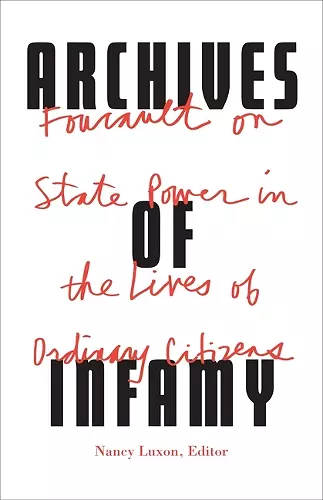Archives of Infamy
Foucault on State Power in the Lives of Ordinary Citizens
Thomas Scott-Railton translator Nancy Luxon editor
Format:Hardback
Publisher:University of Minnesota Press
Published:20th Aug '19
Currently unavailable, and unfortunately no date known when it will be back
This hardback is available in another edition too:
- Paperback£23.99(9781517901110)

This book explores power dynamics between police and communities, drawing on Farge and Foucault's insights. Archives of Infamy offers new perspectives on justice and social relationships.
The book Archives of Infamy delves into the intricate dynamics between policing, public order, and the everyday lives of individuals. It expands upon the foundational insights of Arlette Farge and Michel Foucault's earlier work, Disorderly Families, exploring how ordinary citizens might engage with and influence the flow of power between law enforcement and the communities they serve. The authors pose thought-provoking questions about the role of police in society and how their understanding of responsibility has evolved over time.
This volume brings together a diverse array of unpublished materials, including radio broadcasts, essays, and book reviews, all aimed at providing historical context to the themes discussed in Disorderly Families. Among the contributions are new translations of significant texts, including a 1983 radio address by Foucault that elucidates his writing process, as well as essays by both Foucault and Farge that have not been readily accessible in English. These insights shed light on the ways historians have interpreted and utilized Foucault's theories.
Archives of Infamy challenges traditional debates between historians and philosophers, offering fresh perspectives on the formation of social relationships, family structures, and political authority. By examining these connections, the book invites readers to reconsider the implications of power dynamics in contemporary society and how they manifest in daily life.
"Listening to the voices rising from the archives, grasping the distant echoes of confrontations with power, exhuming the tenuous grain of tiny existences—this is what Michel Foucault chose to do. Does the philosopher’s gesture conflict with the historical understanding of archival material? This look back at an exciting debate asks: is it possible to build together a concern for anonymous lives, a literary passion for documentary fragments, and the desire to make a history of the discourses and practices of power?" —Judith Revel, Université Paris Nanterre
"The book should be of interest to Foucault scholars, political scientists, historians of eighteenth century France, as well as general readers."—Foucault Studies
ISBN: 9781517901103
Dimensions: 216mm x 140mm x 51mm
Weight: unknown
400 pages